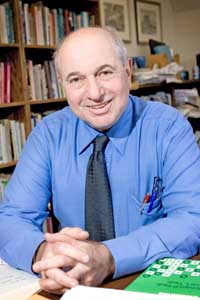Richard Taub, the Paul Klapper Professor in Social Sciences, Chairman of the Committee on Human Development, Professor in Sociology
By William HarmsNews Office
 | |
In working with graduate students as they do their field research, Richard Taub, a 2004 recipient of a Faculty Award for Excellence in Graduate Teaching, tried to pass on the lessons he has learned.
“People who don’t do field research sometimes assume that it’s easy,” Taub said. “But it isn’t. It requires that you build trust. It’s not like an experiment where you’re paying people to participate. You depend on your ability to create good will in order to make successful field work happen. And you have to make sense of the rich and diverse activity bombarding your senses”
Taub, the Paul Klapper Professor in Social Sciences, Chairman of the Committee on Human Development and a Professor in Sociology, teaches a course in urban fieldwork to students in Sociology, Human Development, the Irving B. Harris Graduate School of Public Policy Studies, the School of Social Service Administration and the Master of Arts Program in the Social Sciences.
“I start by having them go to a Chicago neighborhood, stand on a corner and observe what they see,” Taub said. “I then have them hang out in a bar or a laundromat to learn about the community and attend one ritual event.
“I also require that they make a friend. That way they can have someone as their guide, someone who can introduce them to people and someone who can help them understand what is happening in the community that might not otherwise be obvious,” he said.
Taub and the entire class read the students’ field notes and suggest topics to pursue to deepen their understanding of the neighborhood or people they are studying. This careful examination has led to a number of interesting projects, including a dissertation based on fieldwork in a “neighborhood” that was a gambling casino in Indiana. The student studied the ways players who understand probability in the game of blackjack often ignore what they know in the decision-making process, such as where to sit during the game.
“My style in teaching is to encourage students. When I read their field notes, for instance, I look for growing edges on their research and their good ideas,” Taub said.
Taub also finds he learns from graduate students. He teaches a class on entrepreneurship, which has led to a class he is teaching this year on honor, which looks at ways people value self-respect above rational choices that would bring them more wealth, for instance. In the honor class, students have brought their own perspectives, including how they see honor working out as part of status in an array of settings, such as Native-American activities and bullfights.
“What I like about the students is their creativity. It’s one of the things I’ve noticed about our Human Development students. Because our program is so interdisciplinary, the students have the freedom to come up with great ideas,” he said.
Taub credits two of his teachers in particular for his perspective on teaching. “I had an English teacher in 11th grade in high school, Jack Fields, who taught us how to be good writers and how to think outside the box. When I was in graduate school, I had an excellent mentor, an anthropology professor named Cora DuBois, who encouraged me to go to India, and who read my field notes from there and commented on them,” he said.
In addition to working in India, Taub’s fieldwork has taken him through many Chicago neighborhoods where he has studied economic development. Those activities resulted in the publication of five books. Taub’s study of urban Chicago led to an invitation by then-Governor Bill Clinton to come to Arkansas to study economic development there.“I spent seven years flying to Arkansas every other week. Later this year, I will publish a book from those experiences, Doing Development in Arkansas,” he said.
![[Chronicle]](/images/sidebar_header_oct06.gif)